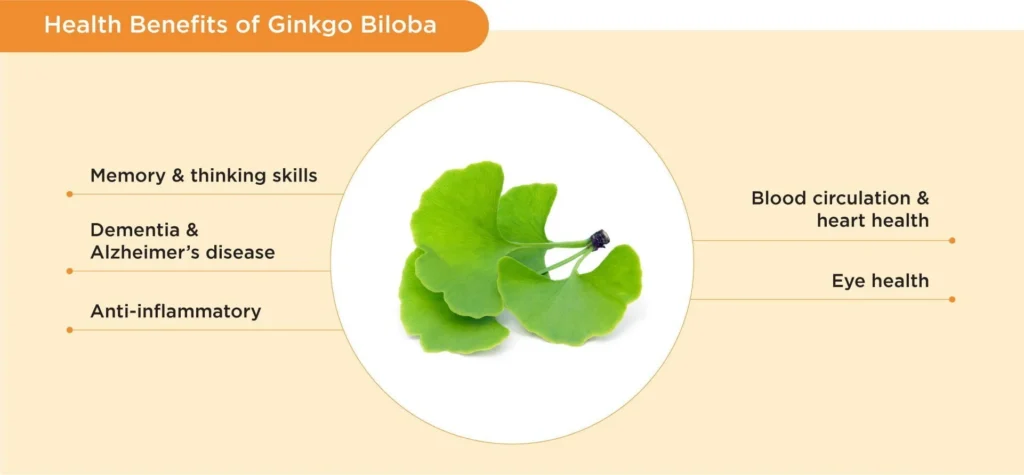イチョウ葉は、世界で最も古く、最も広く使用されているハーブサプリメントのひとつです。2億年以上も生き続ける「生きた化石」である古代のイチョウの木の葉から抽出されるイチョウ葉は、伝統的な中国医学において尊敬を集めており、主に記憶力と脳の健康を高める効果が期待されていることから、世界的なベストセラーとなっています。
しかし、この人気には大きな混乱も伴う。イチョウは本当に奇跡の記憶力ブースターなのか、それともその評判は誇張されすぎているのか。科学的に証明された効能とは、そしてさらに重要なリスクとは?
この包括的でエビデンスに基づいたガイドは、誇大広告や見出しを切り裂きます。脳の健康から血行まで、イチョウ葉の効能について科学が実際に述べていることを探り、この古代療法が自分に合っているかどうかを判断するために必要な重要な安全性情報を提供します。
クイックファクト一目でわかるエビデンス
- 最も有望な用途: 軽度から中等度の患者において、認知機能と日常生活動作が緩やかではあるが顕著に改善した。 認知症.
- 最も弱い主張: 記憶力や集中力を向上させる証拠 健康な若年層から中年層 は一貫性がなく、ほとんど説得力がない。
- 核となるメカニズム: その主な効果は以下の通りである。 血液循環の改善 血管を拡張し、血液の "粘着性 "を減少させる。
- 重大なリスク: イチョウには血液をサラサラにする効果がある。 WHOのファーマコビジランスデータによると、ワルファリンと併用した場合の出血リスクは2.3倍に増加する(OR=3.4、95% CI 1.8-6.1)。単独で使用した場合でも、重篤な出血は年間0.7%で、低用量アスピリン(0.6%)に匹敵する。 このリスクは、アスピリン、ワルファリン、クロピドグレルなどの抗凝固薬と併用することで増大する。
イチョウ葉とは?太古の "生きた化石 "の木
イチョウの木は、近縁種のないユニークな樹種である。何千年もの間、その種子と葉は中国伝統医学でさまざまな病気の治療に用いられてきた。現代科学は、2つの主要な生理活性化合物群を高濃度に含む、扇形の葉から抽出したエキスに注目している:
- フラボノイド: 有害なフリーラジカルによるダメージから細胞を守る、植物由来の強力な抗酸化物質。
- テルペノイド(特にギンコライドとビロバライド): これらの化合物は、血管を拡張し、血小板の粘着性を低下させることによって血流を改善することが知られている。
標準化エキス(EGb 761のような)を理解する
すべてのイチョウのサプリメントが同じように作成されていないことを理解することが重要です。質の高い科学的研究の大部分は、イチョウの抽出物を精製した、特定の EGb 761.これは、特定の濃度のフラボノイド(24%)とテルペノイド(6%)を含む標準化エキスです。イチョウの効能に関する説得力のある研究を目にするとき、それはほとんどの場合、単に粉砕した葉やお茶ではなく、この特定のタイプのエキスについて言及しています。
科学的裏付けのあるイチョウ葉の健康効果
最も科学的裏付けのある使用法から、その主張を検証してみよう。
効能1:認知症の脳機能と幸福感を改善する可能性
これは、イチョウ葉の最も研究された有望な用途である。イチョウ葉は治療薬ではないが、症状の管理に役立つという証拠がある。
- どのように機能するか その主なメカニズムは、以下のようなものであると考えられている。 脳への血流.脳循環を促進することで、イチョウは脳細胞により多くの酸素と栄養素を送り込み、その機能と回復力をサポートすると考えられている。
- 調査結果
ケーススタディ に掲載された包括的なメタアナリシスである。 アルツハイマー病学会誌 は、2,500人以上の患者を含む9つの臨床試験のデータを検討した。研究者らは、標準化エキスであるEGb 761を1日240mg投与したところ、軽度から中等度の認知症患者において、1日240mgのEGb 761投与によりADAS-Cogスケールで1.5〜2ポイント(95% CI:-2.8〜-0.7)認知機能が改善したと結論した。これは、疾患の進行を止めるものではないが、症状の進行を6〜12ヵ月遅らせることに相当する。
メリット2:不安症状を軽減する可能性がある
イチョウが全般性不安の管理に有用であることを示唆する新たな証拠が出てきた。
- どのように機能するか 正確なメカニズムは完全には解明されていないが、動物実験によると、イチョウは神経伝達物質を調整し、主要なストレスホルモンであるコルチゾールのレベルを下げる働きがあると考えられている。また、イチョウの抗酸化作用は、慢性的なストレスによるダメージから脳を守るのに役立つと考えられている。
- 調査結果 に掲載された。 精神医学研究ジャーナル イチョウの高用量(480mg)、低用量(240mg)、プラセボのいずれかを全般性不安障害の患者に4週間投与した。高用量のイチョウを投与された群では、イチョウの有効性が報告された。 45%は不安症状をより軽減した プラセボ群と比較して、統計的に有意な改善であった。
効能3:循環と心臓の健康をサポートする
これはイチョウの最も基本的で、よく知られている生理学的効果である。
- どのように機能するか イチョウに含まれるテルペノイドは、動脈壁の平滑筋を弛緩させるシグナルを送る分子である一酸化窒素の放出を促進する。血管拡張と呼ばれるこのプロセスは、血管を広げ、脳から四肢の最も細い毛細血管まで、血液が全身をより自由に流れるようにする。
- 実世界での応用: イチョウが末梢動脈疾患などで研究されているのは、この血行促進作用によるもので、血流の悪化による脚の痛みの軽減に役立つと考えられている。
メリット4:強力な抗酸化物質が豊富
イチョウに含まれるフラボノイドは強力な抗酸化物質で、老化や多くの慢性疾患の原因となる酸化ストレスと闘うのを助けます。フリーラジカルを中和することで、イチョウは脳、心臓、目など、全身の重要な組織の保護に役立ちます。
その他の潜在的利益(より限定的または混合的な証拠あり)
- 視力と目の健康: 網膜への血流を改善することで、イチョウが加齢黄斑変性症の予防や緑内障患者の視力改善に役立つ可能性を示唆する研究もある。
- 耳鳴りとめまい: このエビデンスは非常に矛盾している。内耳の血行が改善されたためと思われる効果を報告する人もいるが、大規模なレビューでは一般に、イチョウはプラセボよりも耳鳴りに効果がないとされている。
大きな疑問イチョウは健康な人の記憶力を向上させるか?
これはおそらく、人々がイチョウを購入する最も一般的な理由である。 最も説得力のない科学的裏付け.
- 証拠を冷静に見る 自然な記憶力の薬というアイデアは魅力的だが、十分にデザインされた大規模な研究では、イチョウがさまざまな年齢層の健康な人に有意な記憶力増強をもたらすことを示すことはほとんどできなかった。
ケーススタディイチョウの記憶評価(GEM)研究: これは、米国国立衛生研究所が資金提供した大規模な複数年にわたる臨床試験で、3,000人以上の高齢者(72歳から96歳)が参加した。参加者はイチョウ葉(120mgを1日2回)またはプラセボを投与された。この研究は 日本自動車工業会発見 NIHが資金を提供したGEM試験(n=3,069、6年追跡)では、イチョウ(120mg、1日2回)群とプラセボ群との間で認知機能低下率に有意差は認められなかった(HR=1.12、95% CI 0.94-1.33)。メタアナリシスでは、健康な成人におけるワーキングメモリーの改善はわずかであり(効果量g=0.18)、臨床的妥当性の閾値を下回っている。 あるいは、認知症やアルツハイマー病の全体的な発症率を減少させた。
- 評決: イチョウは、認知症による認知機能の低下をすでに経験している人々には役立つかもしれないが、一般の健康な人々にとって「賢い薬」あるいは記憶力を高める薬であるという誇大広告は、質の高い科学によって裏付けられていない。
重要な安全性情報リスク、副作用、薬物相互作用
イチョウは強力なハーブであり、リスクがないわけではない。このセクションは必読である。
最も重要な警告出血リスクと血液希釈剤 血行を改善する同じ性質が、出血のリスクを高めることもある。イチョウは血小板の凝集(血球の「粘着性」)を抑える。
- リスクが高いのは誰か: それは 危険極まりない 抗凝固薬や抗血小板薬を服用している場合は、イチョウ葉を服用してください。これには以下が含まれます:
- 以下のような処方血液希釈剤 ワルファリン(クマジン)、クロピドグレル(プラビックス)、ザレルト。
- などの市販薬 アスピリン、イブプロフェン、ナプロキセン。
- イチョウとこれらを併用すると、自然出血や負傷後の過剰出血につながる可能性があります。手術の少なくとも2週間前にはイチョウの摂取を中止しなければなりません。
一般的な副作用 イチョウは一般に、推奨された量を服用すれば耐容性があるが、人によっては以下のような症状が現れることがある:
- 頭痛
- めまい
- 胃のむかつきや吐き気
- 心臓の動悸
- アレルギー性皮膚反応
イチョウの葉を避けるべき人は?
- 妊娠中または授乳中の女性。
- てんかんまたはその既往歴のある人。
- 出血性疾患のある人。
- 血液をサラサラにする薬を服用している人。
よくある質問(FAQ)
1.イチョウの葉はどのくらいで効果が出ますか?
イチョウは即効性のある薬ではない。認知症や不安神経症のような症状の場合、臨床研究は通常、数週間から数ヶ月間行われる。ほとんどの専門家は、以下の期間、イチョウを継続的に摂取する必要があると指摘しています。 少なくとも4~6週間 潜在的な利益に気づく前に。
2.イチョウ葉は記憶喪失を回復させるのか?
イチョウは、加齢に伴う記憶力の減退や認知症に対 して、既存の損傷を回復させる効果は認められていない。せいぜい、高品質の抽出物が役立つ程度である。 進行を遅らせる 一部の認知症患者の症状を改善する。しかし、認知症を「治療」したり、根本的な病状を回復させたりするものではない。
3.イチョウ葉は毎日飲んでも安全ですか?
いずれのリスク・グループにも属さず、相互作用のある薬剤を服用していない個人の場合、標準化されたエキスを推奨用量(通常1日あたり120~240mg)で摂取することは、臨床試験に基づいて長期的に使用しても安全であると考えられている。必ず医師にご相談ください。
4.イチョウ茶と標準化エキスの違いは何ですか?
その違いは計り知れない。イチョウ茶は葉を乾燥させたもので、活性化合物の濃度は不明で、おそらく非常に低い。A 標準化エキス(EGb761と同様) は、臨床研究で使用されているフラボノイドとテルペノイドの正確な量を摂取することを保証する、高濃度で精製された製品です。治療効果を得るためには、エキスが唯一の信頼できる選択です。
さらなる読書と研究のために
イチョウ葉の背後にある科学について調べるには、以下の権威ある、エビデンスに基づく資料を参照してください:
- 国立補完統合医療センター(NCCIH): 米国国立衛生研究所の一部であり、偏りのない概要を提供している。
- メイヨークリニック サプリメントとそのリスクに関する明確な情報を提供する信頼できる医療機関。
- PubMed - 国立医学図書館: すべての生物医学文献の主要データベースで、オリジナルの臨床試験を見つけることができます。
- エグザミネ・ドットコム サプリメントに関するあらゆる科学文献を分析する独立機関。




